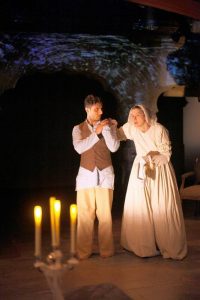A CLASSIC GOES GLOBAL
It’s a marriage made in theater heaven: With a newly great Great Expectations, two very different Chicago theaters find common ground. The result is a cross-cultural version of Charles Dickens’ loss-of-innocence/coming-of-
Running almost 200 minutes, set in 1861, Gupta’s sprawlingly faithful and often passionate 2010 adaptation conveys the scope of Dickens’ serialized novel and his fervent remembrance of a conflicted childhood. The book’s core crises remain unchanged but the Indian setting’”a hamlet and Calcutta four years after the anti-British “Sepoy Mutiny” (that set the course for Mohandas Gandhi)’”alters everything.
Pip (Anand Bhatt), Dickens’ reluctant hero, is an open-hearted adolescent living in a caste-ridden village. The lad has been affectionately raised by his good-hearted protector and in-law, the cobbler Joe Gargery (Anish Jethmalani). Pip finds a fine friend with unpretentious Biddy (Rasika Ranganathan), lowly only in her origins.
Humble and happy, one day Pip does a kind deed by feeding and sheltering Magwitch (Robert D Hardaway), an African convict who escapes from a prison “hulk.” This Samaritan deed will change Pip’s life in ways he won’t discover until he undoes the flaws he’s formed.
Pip is further alienated from Joe’s simple decency when he becomes a plaything for an Anglo-Indian recluse, the mysterious Miss Havisham (Linda Gillum). Living in perpetual darkness and raging against the creature who broke her heart, this patrician harridan forces her beautiful African-Indian ward Estella (Netta Walker) to break Pip’s heart. Estella is the agent of destruction who will avenge Miss Havisham’s jilted misfortune. (Here Estella becomes a classic case of black looking down on brown because they’re both not white.) Pip falls deeply for the cold and disdainful heiress, a devotion that remains singularly unreturned.
Pip comes into an unexpected’”and anonymous’”bequest that frees him to move to the big city of Calcutta to increase his fortune. Here Gupta’s treatment finds its ideological cutting edge. Under the tough-loving guidance of his guardian, lawyer Jaggers (Roderick Peeples), and the ebullient friendship of Herbert Pocket (Lane Anthony Flores), a young English capitalist, Pip undergoes a wrenching identity crisis: He’s slowly transformed into that anomaly, a useful’”indeed, essential’”colonial hybrid who can advance the Empire’s interests.
 Or, as he calls it, “aping the English.” Losing his Indian roots as he adopts British mannerisms, our parvenu, purse-proud Pip dwindles into a snob, despising his previous poverty and ignorance. (It’s curious how much Pip resembles G.B. Shaw’s Eliza Doolittle, a Covent Garden flower girl who, stripped of destitution, becomes miserably respectable and uselessly fashionable.)
Or, as he calls it, “aping the English.” Losing his Indian roots as he adopts British mannerisms, our parvenu, purse-proud Pip dwindles into a snob, despising his previous poverty and ignorance. (It’s curious how much Pip resembles G.B. Shaw’s Eliza Doolittle, a Covent Garden flower girl who, stripped of destitution, becomes miserably respectable and uselessly fashionable.)
Dickens/Gupta powerfully draw the plot’s fault lines. Pip is tested with the truth’”about his misattribution of the real benefactor, the ingratitude he shows trusting Joe, and the false ardor he feels for cruel Estella and her life-loathing sponsor Miss Havisham (Dickens’ female equivalent of Ebenezer Scrooge). Gupta may lessen the melodrama of Dickens’ later exposures (but not the contrivances). But, fattening an already overplotted second act (hobbled with too many back stories), as the story comes full circle she lumbers the novel’s resolution with a plethora of valedictory and editorializing epilogues.
 Happily, the overwritten final scenes don’t harm the drive or depth of this broadened and equally enlightening Great Expectations. It remains the product of a dynamic, East-meets-West theatrical partnership. Yeaji Kim’s exotic and period-right scenery and projections meld with Elsa Hiltner’s class-conscious costumes and Lindsey Lyddan’s mood-altering lighting to contrast city and country, as well as want and wealth.
Happily, the overwritten final scenes don’t harm the drive or depth of this broadened and equally enlightening Great Expectations. It remains the product of a dynamic, East-meets-West theatrical partnership. Yeaji Kim’s exotic and period-right scenery and projections meld with Elsa Hiltner’s class-conscious costumes and Lindsey Lyddan’s mood-altering lighting to contrast city and country, as well as want and wealth.
Despite thick accents that make for challenged listening, fourteen players from two companies register everything Dickens intended and Gupta amplifies. Bhatt’s resilient, supple, muscular and sadly elitist Pip; Walker’s broken, brittle Estella; Flores’s ever-eager Herbert; Ranganathan’s warm-hearted Biddy; Alka Nayyar playing Pip’s fussbudget sister; Gillum’s anguished, vengeful Miss Havisham; Peeple’s delightfully dithering solicitor; Hardaway’s score-settling Magwitch’”these marvelous creations trenchantly deserve each other. The strongest praise, however, goes to Anish Jethmalani: His genuinely gentle Joe is as endearing as believable.
It’s a three-hour treasure. Remy Bumppo/Silk Road Rising’s replenished offering renews Dickens’ social criticism through Gupta’s cultural critique. If we didn’t before, we know exactly whose shoulders had to carry the “white man’s burden” for Victoria, Empress of India. Gupta may not exceed Expectations but she’s sharpened Dickens’ indictments and widened his compassion.
photos by Johnny Knight
Great Expectations
Silk Road Rising and Remy Bumppo Theatre Company
Historic Chicago Temple Building, 77 W. Washington St. Lower Level
Thurs at 7:30; Fri at 8; Sat at 4 & 8; Sun at 4
ends on July 2, 2017
for tickets, call 312.857.1234 x 201 or visit Great Expectations
for more info, visit Silk Road Rising or Remy Bumppo
for more shows, visit Theatre in Chicago



